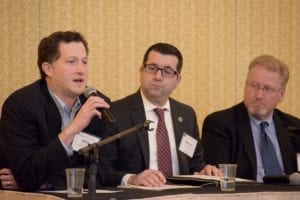Who is a member?
Our members are the local governments of Massachusetts and their elected and appointed leadership.

Lenox-Lee Chief Administrative Officer Chris Ketchen (l-r) shares his experiences in running a small town at the Massachusetts Selectmen’s Association Fall Conference on Oct. 20 in Devens. Listening are Winchester Selectman Michael Bettencourt, moderator of the breakout session, and Carlisle Town Administrator Timothy Goddard.
Selectmen from across the state shared ideas, concerns and challenges, particularly around retaining a qualified finance staff, in a session on best practices for managing small towns during the Massachusetts Selectmen’s Association Fall Conference on Oct. 20 in Devens.
Chris Ketchen, the chief administrative officer for Lenox and Lee, said finding and retaining a qualified finance team, especially an accountant, is one of the hardest parts about managing a small town. Over the years, the number of larger firms working on municipal audits has decreased, Ketchen said, as corporate work became more financially viable, resulting in a more shallow pool of candidates for towns to draw from.
“It can be debilitating,” Ketchen said. “If you have a qualified, capable town accountant, by all means do whatever you need to do to keep that person in your town.”
The MMA participated in a working group convened by Lt. Gov. Karyn Polito that released a report on May 15 to address the dearth of qualified professionals ready to step into municipal finance positions.
Carlisle Town Administrator Timothy Goddard stressed the need to provide professional development and training opportunities to employees so they can rise through the ranks, take on greater responsibilities, and create a strong team of department heads.
Low-cost and free training is available through the MMA, MIIA and town counsels, in addition to financial certification programs and training held regularly at the University of Massachusetts Amherst.
“It’s always hard to find time to get out of the office, to take that training and sometimes to maintain the certification, but it’s vital they maintain their skill set,” he said. “The opportunity to network with their peers is very valuable as well.”
If a town can’t afford the salary for hiring a town administrator or manager, Ketchen said, it should direct those resources as much as possible to training staff.
Sharing services is another area that small towns need to explore, Ketchen said. With smaller pools of candidates for positions such as building inspectors, and limited financial resources, communities can work together to create more attractive, full-time positions with benefits.
Limited resources frustrate
Sherborn Selectman and MSA First Vice President Paul DeRensis lamented the inability of small towns to match the salaries of larger communities, while selectmen need to be well-informed about a wide-range of issues, including police matters, tree removal and septic systems.
“In some ways, it’s much harder to be a selectman in a small town,” he said. “I don’t have the resources. I don’t have the people.
“So I should say that selectmen in small towns should get paid,” he said to laughter from the audience.
Charlemont Select Board member Marguerite Willis echoed DeRensis’ frustration, noting that people in her community are now opposed to regionalization efforts because the regionalized school district resulted in a loss of financial control and “it almost bankrupted the town.”
Willis expressed frustration about local aid, particularly in the foundation formula for public education funding. She added that the town undertook an Americans with Disabilities Act self-assessment and now has a long list of projects that it doesn’t necessarily have the resources to complete.
“I’m just not hearing a lot of solutions because we’re doing all these [collaborative efforts] and we’re struggling,” Willis said. “We have an elderly population, some of our towns have 50 percent elderly. I don’t want zoning that prohibits housing. I want to know how we encourage housing, or are we just going to die off and Western Massachusetts is going to be a big state forest.”
Williamstown Selectman and MSA Secretary Andrew Hogeland said the MSA has agreed to collaborate with the state Rural Policy Advisory Commission, which is working on a policy plan specifically for small towns and will be holding listening sessions across the state.
“It is, to me, the most exciting thing I’ve seen being done for small towns in my career,” Hogeland said.